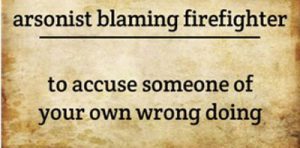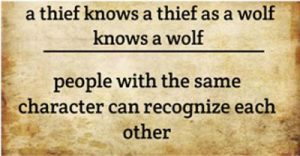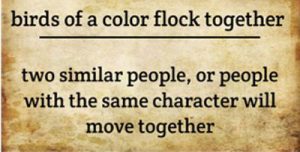What does it really mean when someone says “pot calling the kettle black?” Pot calling kettle black is a phrase that means someone with a fault or sin is accusing someone else of the same.
The accused might not even be guilty if the accusation bit the accuser is oblivious if the fact that the same accusation or criticism applies to them.
When you use this phrase on someone they are the “pot” who is much worse or more deserving of whatever criticism they are throwing at others.
Pot Calling Kettle Black Origin
The phrase “Pot Calling the Kettle Black” is of Spanish origin and it came in 1620 when there was a translation of the Cervantes novel, “Don Quixote”.
Here’s the line: “You are like what is said that the frying-pan said to the kettle, ‘Avaunt, black-brows’.” The word “avaunt” is an archaic expression that means “go away”.
In the quoted sentence the frying-pan is sending the kettle away for being dirty when it is just as dirty itself.
In the early 17th century, it was translated to English and of course, it went through several modifications and alterations till we have the idiom that we are discussing today.
If you are not one for old sayings, I have a list of fresh modern ones that will pass the same message across and will make you sound dignified.
11 Phrases Similar to Pot Calling the Kettle Black
- Accuser accusing the accuser
- Adulterer casting stones
- Arsonist blaming the firefighter
- As alike as two peas in a pod
- Only a thief can call out a thief
- Backstabber blaming the loyal one
- Birds of a color flock together
- It takes one to know on
- Rogue knows another
- Wrongdoer recognizes wrongdoer
- You’re one to talk
Accuser accusing the accuser
A good phrase you can use instead of “pot calling kettle black” is “Accuser accusing an accuser.”
This might not make sense and it will seem like it should be the accused but it’s correct.
Accusers are usually the ones to do the wrong thing that they are condemning you for so that makes two, the first wrongdoer and the second wrongdoer who is against the first wrongdoer.
Most times, in a situation like this, it starts out with one person pointing out the mistakes of another person and then the other person retaliating by accusing the other in return.
Soon it’s a battle for who can expose the other more. Here’s how you make use of the phrase:
Tracey is being chewed out by Brad and his squad. Seems to me like the case of the accuser accusing the accuser.
Adulterer casting stones
If you read bible stories as a kid, you must have the story of the adulterer in the bible who was to be stoned for her sin. Well, she wasn’t, lucky her.
If someone else who has done something wrong accuses you or wants to attack you for what you did wrong, they are the adulterer who is casting stones.
Normally they shouldn’t because they are also guilty of the same thing, but if they do then you should use this on them.
Arsonist blaming the firefighter

It means to accuse someone of your own wrongdoing. This one’s really funny because if you think about it, an arsonist is in fact the one who started the fire and should be blamed but the firefighter who is putting out the fire.
This kind of situation is possible if the arsonist in a situation knows that in one way or the other, he or she can blame the firefighter.
For example, the firefighter couldn’t contain the fire quickly and there was more damage. It would make both look guilty and that makes the arsonist happy.
Here’s how to use the phrase:
Jack really tried his best to appease the customer for Simeon’s mistake, and Simeon is still trying to heap blame on him. That’s an arsonist blaming the firefighter.
As alike as two peas in a pod
Two peas in a pod is another popular phrase to use instead of pot calling kettle black.
When two people are guilty of the same thing, you can say that they are as alike as two peas in a pod because their wrongdoing gives them similar characteristics.
They both know they are wrong but one will try to act holier than the other and criticize him mercilessly. It can also be that they have the same character that makes them different from others.
For example, a miser calling a tightfisted man stingy. Here’s how to use this phrase in a sentence:
If that’s your issue with me Cynthia then should know that when it comes to that, we are two peas in a pod.
Only a thief can call out a thief

A thief can call out a thief means people with the same character can recognize each other. It’s like how you can tell that something is spoilt by its awful smell.
The comparison to a wolf here is because a wolf will always recognize its kind, even in the dark.
f you say this to someone, it means that you know that both of you share the same traits no matter how much you want to hide it or pretend to be against it.
Backstabber blaming the loyal one
This is similar to the idiom about the arsonist and the firefighter. It means that the guilty person is trying to blame the innocent one.
In this case, they might trick others into thinking that the loyal one is actually against them so that they will look like the loyal and supportive friend themselves.
It’s a good idiom to expose them and their evil intentions. Here’s an example:
You know Travis, you are the backstabber blaming the loyal one. Stephanie told me everything so enough with your lies.
Birds of a color flock together

Birds of a color flock together mean that two similar people or people with the same character will move together.
Although the two in question aren’t necessarily close friends, they share a similar character, which leads to their “flocking together” behavior.
Birds of a feather do really flock together, however, the phrase has been cleverly changed to refer to the color black in the expression “pot calling kettle black” by changing the feather to color.
Here’s how to use this phrase:
I heard about the theft case and I’m not surprised. The two are birds of a color that are flocking together.
It takes one to know one

This means that for the person accusing you to know that you have done that thing, he or she must be guilty of that same crime himself.
It’s a pretty smart way to shut someone up, especially if they are also people involved in the same mess as you. That will teach them not to cast stones.
This reply also exposes them too so if they have been getting away with it then you can use it.
Keep in mind that, as an onlooker, you can’t use this phrase unless you want to falsely accuse yourself. Here’s how to use this phrase in a sentence:
You know Dave, it takes one to know one so since you know and can prove how I stole this pendant, you must not be new to this business yourself!
Rogue knows another
A rogue is a trickster who steals. They will fascinate you with tricks but steal your wallets or earrings (hey that rhymes!)
Anyway, a rogue knows another means that two people with similar traits can easily identify themselves. If someone who is a rogue is accusing you of being a rogue, you can throw this right at them.
Even if you two aren’t rogues you can still use it. And what if you are just being falsely accused? Even better.
You will say sarcastically or pointedly so that they know you are talking to them. This will quiet them. Here’s how to use this phrase in a sentence:
I am sure Beth is involved in this scandal. She does have questionable character, and with how she was able to easily pick out Steve, sounds to me like a case of rouge knows another.
Wrongdoer recognizes wrongdoer
This is very simple and easy to understand and whoever you tell this to will know that you are attacking them and you know what they have been up to.
On the other hand, it also means you are admitting to the wrong that you have done.
Here’s how to use this:
You think that just because you found me out, you are smart. What you are is a wrongdoer that recognized another. If you snitch on me, I will snitch on you, and you have done way worse, missy!
You’re one to talk
This phrase simply means that they who have done the same thing are criticizing you like they haven’t.
It is also something surprising since you know that they have done something just as bad and are speaking like they are saints, ready to condemn you. Here’s how to use this phrase:
You are one to talk to, Steve. I know you are the one behind the stolen cash, so you better pipe down or I will spread that news to the whole school.
Did you find any of these alternatives interesting? Let us know in the comments below. And if you have any other ideas you can also drop them below.